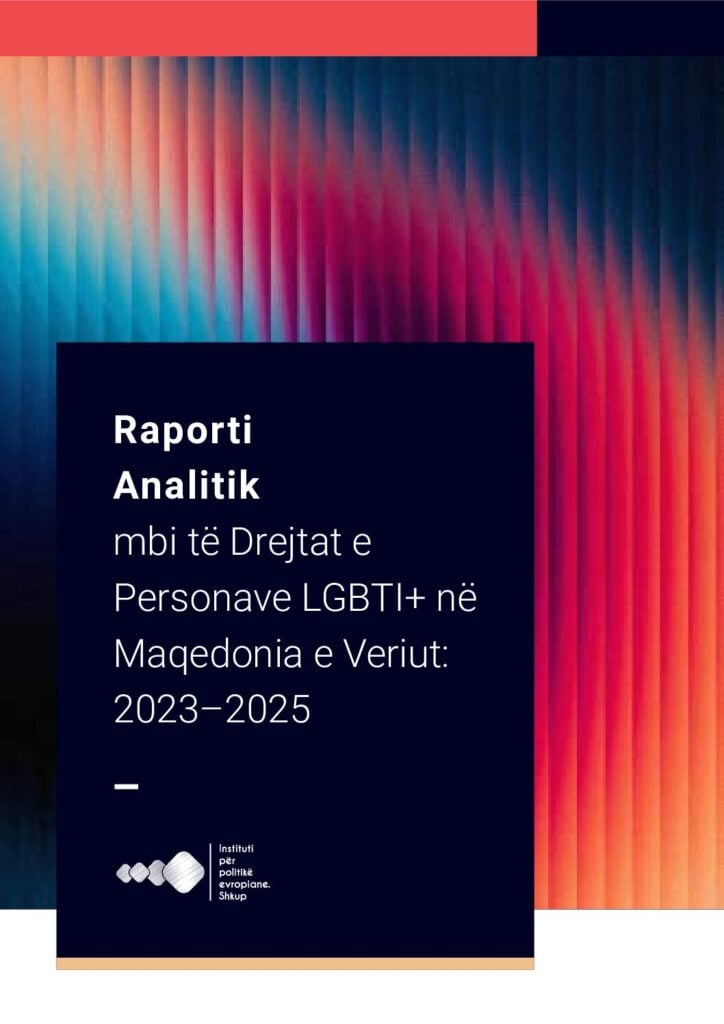 Personat LGBTI+ në Maqedoninë e Veriut vazhdojnë të përballen me diskriminim, dhunë dhe përjashtim social të përhapur, me barriera sistemike që kufizojnë të drejtat dhe sigurinë e tyre. Sipas anketës III të BE-së LGBTIQ të Agjencisë për të Drejtat Themelore të Bashkimit Evropian (FRA), në Maqedoninë e Veriut vetëm 21% ndihen rehat të jenë të hapur për identitetin e tyre – shumë nën mesataren evropiane prej 51% – ndërsa 74% shmangin në mënyrë aktive shfaqjet publike të dashurisë për shkak të frikës nga ngacmimi. Shqetësimet për sigurinë theksohen më tej nga fakti se 43% shmangin zona të caktuara për të zvogëluar rrezikun e sulmit.
Personat LGBTI+ në Maqedoninë e Veriut vazhdojnë të përballen me diskriminim, dhunë dhe përjashtim social të përhapur, me barriera sistemike që kufizojnë të drejtat dhe sigurinë e tyre. Sipas anketës III të BE-së LGBTIQ të Agjencisë për të Drejtat Themelore të Bashkimit Evropian (FRA), në Maqedoninë e Veriut vetëm 21% ndihen rehat të jenë të hapur për identitetin e tyre – shumë nën mesataren evropiane prej 51% – ndërsa 74% shmangin në mënyrë aktive shfaqjet publike të dashurisë për shkak të frikës nga ngacmimi. Shqetësimet për sigurinë theksohen më tej nga fakti se 43% shmangin zona të caktuara për të zvogëluar rrezikun e sulmit.
Diskriminimi shtrihet edhe në vendin e punës, ku 27% raportojnë se kanë përjetuar paragjykime në punësim, krahasuar me mesataren evropiane prej 19%. Dhuna mbetet një çështje urgjente, me 17% të personave LGBTI+ që raportojnë sulme fizike ose seksuale në pesë vitet e fundit – një shkallë më e lartë se në shumë vende të tjera evropiane. Ngacmimi është gjithashtu i përhapur, me 63% që kanë raportuar incidente të tilla gjatë vitit të kaluar, duke tejkaluar mesataren rajonale. Megjithatë, vetëm 14% e viktimave raportojnë sulme të dhunshme në polici, duke reflektuar një mungesë të përhapur besimi në zbatimin e ligjit.
Ngacmimi dhe diskriminimi në shkolla i margjinalizojnë më tej personat LGBTI+, me 68% të të cilëve janë përballur me tallje, fyerje ose kërcënime për shkak të identitetit të tyre. Institucionet arsimore shpesh nuk ofrojnë një mjedis gjithëpërfshirës, pasi 63% e nxënësve e fshehin identitetin e tyre në shkollë, ndërsa 61% deklarojnë se çështjet LGBTI+ nuk trajtohen kurrë në kurrikulë. Situata përkeqësohet nga përhapja e lartë e të ashtuquajturave ‘praktika konvertimi’, me 32% të të anketuarve që i janë nënshtruar përpjekjeve për të ndryshuar orientimin e tyre seksual ose identitetin gjinor – dukshëm mbi mesataren evropiane prej 24%. Shqetësimet për shëndetin mendor janë gjithashtu alarmante, pasi 18% raportojnë se shpesh mendojnë për vetëvrasje, duke theksuar koston e rëndë psikologjike të diskriminimit dhe kpërjashtimit.
Pavarësisht këtyre sfidave, perceptimet për rritjen e intolerancës janë pak më të ulëta se në vendet e tjera evropiane, me 37% që besojnë se dhuna ndaj personave LGBTI+ është rritur, krahasuar me mesataren e BE-27 prej 59%. Megjithatë, besimi i publikut në përpjekjet e qeverisë mbetet jashtëzakonisht i ulët, pasi vetëm 14% besojnë se autoritetet po adresojnë në mënyrë efektive paragjykimet dhe diskriminimin. Ndërkohë, mbrojtjet ligjore mbeten të pamjaftueshme, pasi partneritetet e të njëjtit seks nuk njihen, duke lënë shumë pa të drejta themelore në fusha të tilla si e drejta familjare, trashëgimia dhe kujdesi shëndetësor. Për më tepër, krimet e motivuara nga paragjykimet nuk regjistrohen në mënyrë sistematike dhe as nuk hetohen plotësisht nga forcat e rendit apo prokurorët, duke kufizuar më tej aksesin në drejtësi.
Mbrojtja e të drejtave LGBTI+ është thelbësore në kontekstin e procesit të Rishikimit Periodik Universal të Maqedonisë së Veriut dhe përpjekjeve për anëtarësim në BE. Si vend kandidat për anëtarësim në BE, Maqedonia e Veriut pritet të përafrojë kuadrin e saj të të drejtave të njeriut me standardet e BE-së, të cilat theksojnë mbrojtjen e grupeve të margjinalizuara, përfshirë personat LGBTI+. Procesi i anëtarësimit në BE kërkon reforma të konsiderueshme ligjore dhe politike për të siguruar trajtim të barabartë, mosdiskriminim dhe mbrojtje të të drejtave themelore – fusha ku Maqedonia e Veriut ka marrë rekomandime të përsëritura.
Të drejtat LGBTI janë njohur si një fushë prioritare për përmirësim brenda Rishikimit Periodik Universal (RPU). Në rekomandimet e ciklit të katërt, RPU theksoi nevojën për mbrojtje më të forta ligjore, përgjigje më të mira të zbatimit të ligjit ndaj diskriminimit dhe dhunës, dhe politika më gjithëpërfshirëse për të mbrojtur të drejtat e grupeve vulnerabël. Përshtatja e politikave kombëtare me këto angazhime është thelbësore jo vetëm për përmbushjen e detyrimeve ndërkombëtare për të drejtat e njeriut, por edhe për avancimin e zhvillimit demokratik të Maqedonisë së Veriut dhe perspektivave të integrimit në BE.
Adresimi i këtyre sfidave kërkon reforma gjithëpërfshirëse ligjore, mbrojtje më të forta kundër diskriminimit dhe politika të synuara për të përmirësuar përfshirjen sociale dhe përgjigjet institucionale ndaj shkeljeve të të drejtave LGBTI+. Kjo analizë shqyrton barrierat sistemike me të cilat përballen personat LGBTI+ në Maqedoninë e Veriut, duke u përqendruar në diskriminim, dhunë, mbrojtje ligjore dhe qëndrime shoqërore, duke theksuar njëkohësisht nevojën urgjente për reforma për të siguruar të drejta dhe mbrojtje të barabarta për të gjithë.
